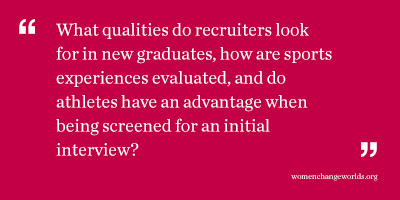This will be the first time that female athletes are allowed to compete in ski jumping at the Olympics so it’s fitting that the 2014 Winter Games in Sochi, Russia open Thursday on the heels of National Girls and Women in Sports Day February 5th.
The satisfaction goes beyond the glow of victory after a long battle because access for female ski jumpers represents progress in the broader quest for gender equity. As in this case, athletics often carry meaning beyond the competition itself.
Sport is both a tool in the quest for political, social, and economic equality and a glass that magnifies the failings of fairness on a societal level. What happens on the field affects and reflects the world off the field (or the slope)-- and vice versa. The cascading events of the 1970s -- the rise of the women’s movement, passage of Title IX, and expanding sport and career opportunities-- express the relationship.
This is important, but well-trod territory. So three of us at WCW asked another question: How does this dynamic actually play out for the individual athlete?
Sports matter off the field, but precisely how do they matter? A study published in 2012 that drew data from polling alumni suggests a connection between college sports participation and higher earnings a decade after graduation. That data relies on a look back by those who had successfully navigated a career launch.
 But how do recruiters on the front-end value a varsity credential? Does sports participation in college, for example, offer access to enter a corporate career?
But how do recruiters on the front-end value a varsity credential? Does sports participation in college, for example, offer access to enter a corporate career?
Given the widespread assumption that sports are a steppingstone to business success, we wanted to know: What qualities do recruiters look for in new graduates, how are sports experiences evaluated, and do athletes have an advantage when being screened for an initial interview? Do male and female, black and white candidates fare equally?
We asked human resource professionals experienced in recruitment to complete a detailed online survey in which they selected from a list of eight leadership attributes the top four they seek in candidates, rate candidate profiles based on those qualities, and rank-order candidates to invite for an interview.
Recruiters received randomly generated profiles that varied sex (signaled by first name), race (signaled by African-American–related extra-curricular activity or not), and leadership experience (athletic or non-athletic). Extracurricular activities were varied to reflect leadership experience in a non-athletic activity (such as Editor-in-Chief of the newspaper or representative to the Board of Trustees) or varsity athletic experience as either a top basketball or track athlete. Candidates had similar GPAs, majors, career interests, and research and work experiences.
Our findings showed that among the 828 recruiters who completed the survey, 72 percent identified “ability to work in a team” as among the top four attributes. Recruiters rated athletes over non-athletes on the ability to work in a team and being results-driven. This held true regardless of a candidate’s sex or the rater’s sex or involvement with athletics as a leisure pursuit. At the same time, athletes received lower ratings than non-athletes on organizational skills, critical thinking, follow-through on tasks, and transferable skills.
The results were surprising and interesting on a few levels. First, it was striking that female athletes got the same “credit” for participation as their male counterparts. Second, even as raters saw athletes as being the classic “team player” and driven to produce results, they seemed unaware of organization skills college athletes need to juggle academics with daily practice, travel, etc. Third, while critical thinking skills may not be explicitly required of athletes, the lower rating suggests a “dumb jock” stereotype at play given that all candidates had similar majors and GPAs. Raters also did not appear to recognize that the follow-through of athletic training and preparation, like a range of other skills, had transferrable value outside of sport.
What does this mean for the individual athlete?
The message is that even though it has nearly become a cliché for managers and corporate leaders to extoll the virtues of athletic participation, the recruiters who serve as gatekeepers screening resumes don’t see it – beyond the obvious “teamwork” credential. Our findings challenge athletes to better articulate just what they are learning on the sport field and how that can be translated off the field. Athletes also must address recruiter beliefs that they struggle with organization and critical thinking. They must also be explicit in describing how positive skills they hone in sport will be useful in the workplace.
Overall, there is notable good news. We found that female athletes received equal consideration as their male counterparts from raters selecting candidates for an interview. Yet, if the experience of playing a college sport builds skills that are valuable in the workplace, our results show that both male and female college athletes must better communicate that message to recruiters, who may have spent their college years in the stands.
Let the Games begin!
This article was contributed by Laura Pappano, Sumru Erkut, Ph.D. and Allison Tracy, Ph.D. Pappano, writer-in-residence at the Wellesley Centers for Women (WCW) at Wellesley College, is an experienced journalist who writes about education and gender equity issues in sports. Research by Erkut, WCW associate director and senior research scientist, encompasses variations in the course of child and adult development. Tracy is a Senior Research Scientist and Methodologist at WCW, where she provides technical expertise in a wide range of statistical techniques used in the social sciences.
When you subscribe to the blog, we will send you an e-mail when there are new updates on the site so you wouldn't miss them.
Comments